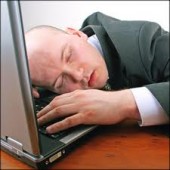Sleep Problems and Bipolar Disorder or Depression
You may feel like the world and, especially work, is a difficult place for you and you’re oversensitive to “normal life.” This happens to many people because their depression and bipolar symptoms are triggered by outside events. Triggers for depression include: poor diet, lack of exercise, relationship issues, staying at home all day, lack of contact with people, a lack of purpose and unusual as it sounds, vacations can trigger depression.
Work Issues Can Trigger Bipolar, Depression Symptoms
In general terms, work is not that much different than home. You may have stress, commitments and missed deadlines, feeling overwhelmed - especially in crowds. Feeling anxious and physically uncomfortable, pressured from others or wanting to run away and hide are some of the symptoms you can perceive at work or home. When we are depressed, we become passive and more withdrawn. You can also have a responsibility shift. The idea of what is holding me back is my want of someone to take care of me and solve my problem. Another depressive trait is the responsibility shift, such as wanting someone to take action for you or the blame game of rationalizing that someone or anyone except you is responsible for your troubles.
Tracking Down Causes of Sleep Problems
 One of the key factors to holding on and participating in the world is the importance of structured sleep. Sleep problems are always one of two issues:
One of the key factors to holding on and participating in the world is the importance of structured sleep. Sleep problems are always one of two issues:
- sleeping too much
- sleeping too little
To try and track down the cause of sleep problems, ask yourself "have I done something to trigger my sleep problems?" Some of the triggers are:
- staying up too late a few nights in a row.
- changing your work hours voluntarily or because of work demands.
Trades shows are particularly hard on anyone, even harder for the depressive or bipolar individual to attend. Time zone changes, social events and changes in diet can lead to behavioral changes. If you have a change in psychiatric medications while traveling or other type of stressful event, it is best to have someone keep a watchful eye on you. You don't have to tell anyone what the medication is for, just watch out for those “side effects.”
One other item to mention about sleeping, when you lie in bed what do you think about? People who sleep well will typically answer “nothing.” Those who think about “everything” or “work” are subject to sleep disturbances. Rumination or brooding happens to a large extent in those with sleep disturbances. Poor memory and concentration are another symptom of poor quality of sleep.
Routine Exercise Can Improve Sleep Problems for Those with Bipolar Disorder or Depression
 An exercise plan or even just a little exercise, such as walking, can be the first step to improving your sleep. Walking or exercising with music or books on your ipod can help improve concentration at the same time. Aerobics, yoga or a team sport can be a great help. Exercising with others gives you the benefit of a physical workout with social contact.
An exercise plan or even just a little exercise, such as walking, can be the first step to improving your sleep. Walking or exercising with music or books on your ipod can help improve concentration at the same time. Aerobics, yoga or a team sport can be a great help. Exercising with others gives you the benefit of a physical workout with social contact.
How much or how long should our exercise be? Starting with a ten minute walk at a standard walking pace is a great beginning. Adding an exercise plan to our sleep program is a great way to start off a recovery plan with going to work as a goal. At times, we deceive ourselves by skipping parts of our recovery plan and think that everything will be okay. Let's keep it to a minimum and go out there.
More information on:
APA Reference
Zawistowski, P.
(2010, November 17). Sleep Problems and Bipolar Disorder or Depression, HealthyPlace. Retrieved
on 2026, February 18 from https://www.healthyplace.com/blogs/workandbipolarordepression/2010/11/work-sleep-and-exercise